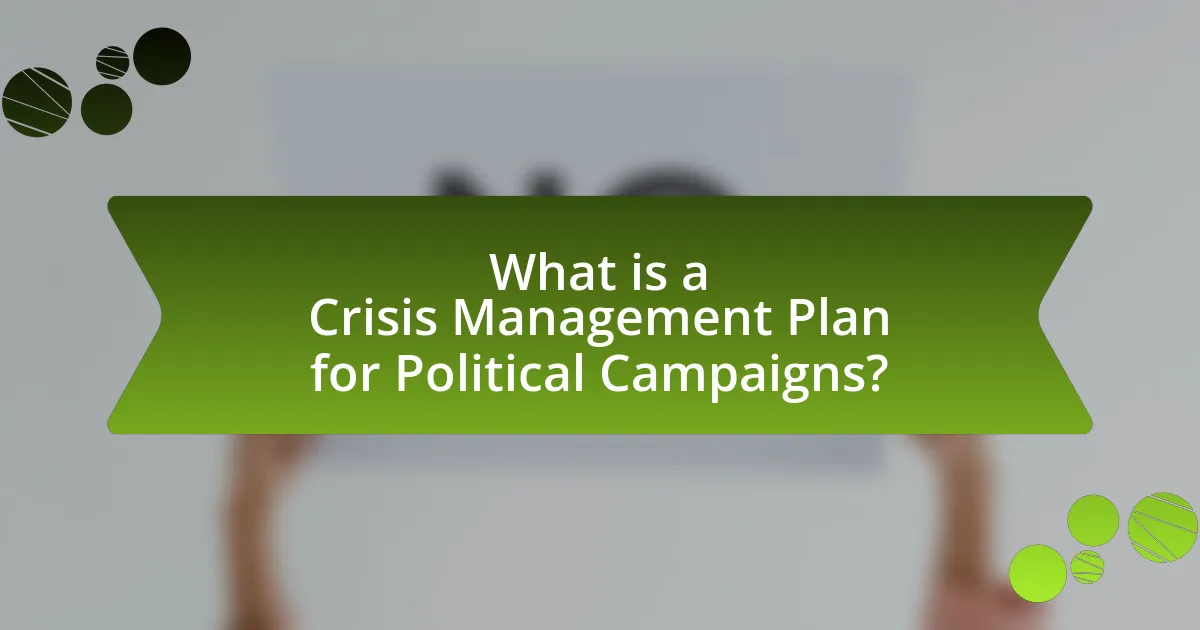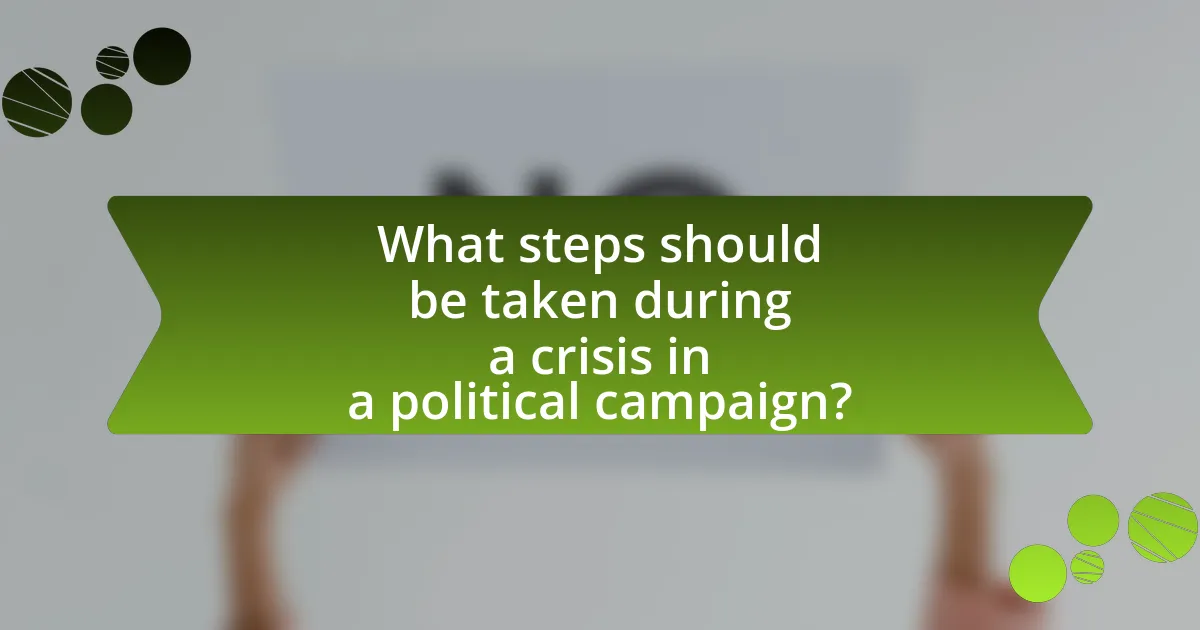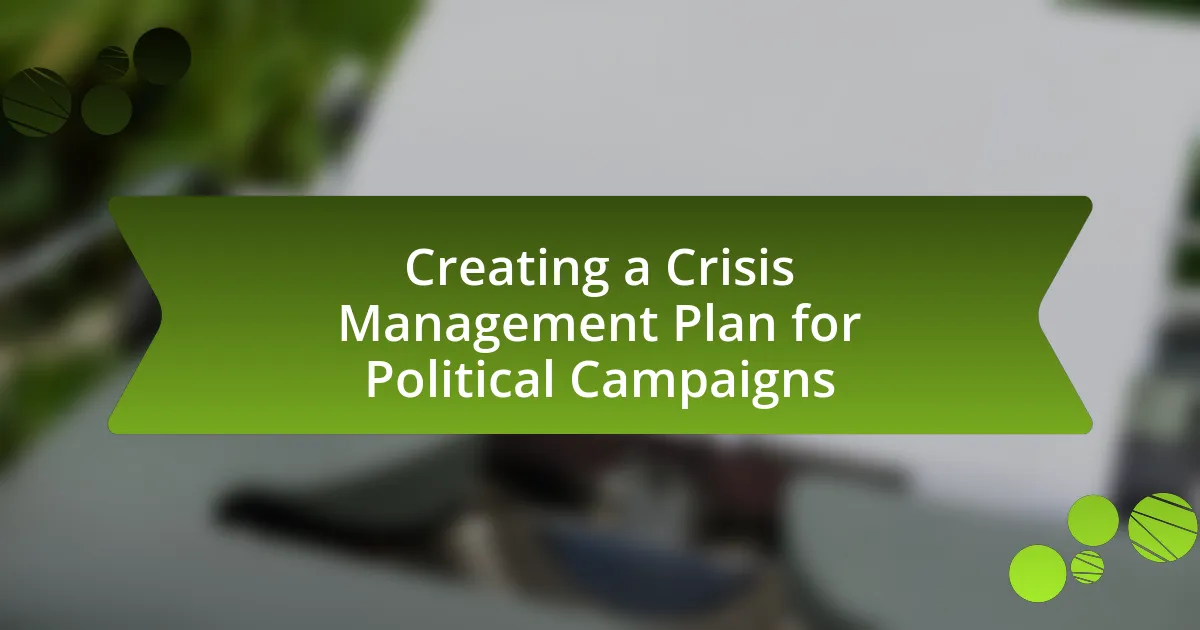A Crisis Management Plan for Political Campaigns is a strategic framework aimed at identifying and mitigating potential crises that could harm a campaign’s reputation. This article outlines the importance of such plans, detailing the types of crises campaigns may face, including scandals and misinformation, and the impact these crises can have on voter perception. Key components of an effective plan include risk assessment, communication strategies, and designated response teams. The article also emphasizes the significance of proactive measures, scenario planning, and post-crisis evaluations to enhance future strategies and maintain public trust during challenging times.

What is a Crisis Management Plan for Political Campaigns?
A Crisis Management Plan for Political Campaigns is a strategic framework designed to address and mitigate potential crises that may arise during a political campaign. This plan typically includes identifying potential risks, establishing communication protocols, and outlining response strategies to protect the campaign’s reputation and maintain public trust. For instance, a study by the American Association of Political Consultants highlights that campaigns with a well-defined crisis management plan are 30% more likely to recover from negative incidents effectively.
Why is a Crisis Management Plan essential for political campaigns?
A Crisis Management Plan is essential for political campaigns because it provides a structured approach to addressing unexpected events that could harm a candidate’s reputation or campaign efforts. Political campaigns often face crises such as scandals, negative media coverage, or public backlash, which can significantly impact voter perception and support. For instance, the 2008 presidential campaign of John McCain faced a crisis when Sarah Palin was scrutinized for her qualifications; having a plan allowed the campaign to respond quickly and mitigate damage. Effective crisis management can preserve public trust and maintain campaign momentum, as evidenced by studies showing that campaigns with proactive crisis strategies are more likely to recover from setbacks.
What types of crises can political campaigns face?
Political campaigns can face several types of crises, including scandals, misinformation, financial issues, and candidate health problems. Scandals often arise from personal misconduct or unethical behavior, which can severely damage a candidate’s reputation and voter trust. Misinformation can spread rapidly through social media, leading to confusion and misperceptions among the electorate. Financial issues may stem from fundraising challenges or mismanagement of campaign funds, jeopardizing the campaign’s viability. Additionally, unexpected health problems of a candidate can create uncertainty about their ability to continue campaigning, impacting voter confidence. Each of these crises requires a tailored response strategy to mitigate damage and maintain public support.
How can a crisis impact a political campaign’s success?
A crisis can significantly undermine a political campaign’s success by eroding public trust and diverting attention from key messages. For instance, during the 2008 U.S. presidential election, the financial crisis shifted voter focus from candidates’ policies to economic stability, impacting campaign strategies. Additionally, a crisis can lead to negative media coverage, which can damage a candidate’s reputation and reduce voter support. Historical examples, such as the fallout from the Watergate scandal, illustrate how crises can derail campaigns and alter electoral outcomes.
What are the key components of an effective Crisis Management Plan?
An effective Crisis Management Plan includes several key components: risk assessment, communication strategy, response team, action plan, and evaluation process. Risk assessment identifies potential crises that could impact the campaign, allowing for proactive measures. The communication strategy outlines how information will be disseminated to stakeholders, ensuring transparency and consistency. A designated response team is crucial for coordinating efforts and making timely decisions during a crisis. The action plan details specific steps to address various scenarios, while the evaluation process assesses the effectiveness of the response and identifies areas for improvement. These components collectively enhance a campaign’s resilience and ability to navigate crises effectively.
What roles do team members play in crisis management?
In crisis management, team members play distinct roles that are crucial for effective response and recovery. Each member typically assumes responsibilities such as communication, strategy development, and operational execution. For instance, the communication officer is responsible for managing public relations and disseminating information to stakeholders, ensuring that messaging is clear and consistent. The strategist focuses on analyzing the situation and developing a response plan that aligns with campaign goals. Operational team members implement the strategies on the ground, coordinating actions and resources to address the crisis effectively. These roles are essential as they ensure a structured approach to managing crises, which can significantly impact the success of political campaigns.
How should communication strategies be structured in a crisis?
Communication strategies in a crisis should be structured around clarity, consistency, and rapid response. Clear messaging ensures that the audience understands the situation and the actions being taken, while consistency across all channels prevents misinformation and confusion. Rapid response is crucial to address the crisis promptly and mitigate potential damage. For instance, during the 2010 BP oil spill, the company’s delayed and inconsistent communication led to public outrage and loss of trust, highlighting the importance of timely and coherent messaging in crisis situations.
How can political campaigns prepare for potential crises?
Political campaigns can prepare for potential crises by developing a comprehensive crisis management plan that includes clear communication strategies, designated response teams, and scenario planning. A well-structured plan allows campaigns to respond swiftly and effectively to unexpected events, minimizing damage to their reputation. For instance, the 2008 Obama campaign utilized a crisis communication strategy that involved rapid response teams to address misinformation and negative press, which helped maintain public support during challenging times. This approach underscores the importance of preparedness, as campaigns that anticipate crises and have protocols in place can navigate challenges more successfully.
What proactive measures can be taken to mitigate risks?
Proactive measures to mitigate risks in political campaigns include conducting thorough risk assessments, developing crisis communication plans, and training staff on emergency protocols. Risk assessments identify potential vulnerabilities, allowing campaigns to address issues before they escalate. A well-crafted crisis communication plan ensures timely and accurate information dissemination, which can prevent misinformation and maintain public trust. Additionally, training staff prepares them to respond effectively during crises, reducing the likelihood of mismanagement. These strategies are supported by research indicating that campaigns with established crisis management frameworks are more resilient and better equipped to handle unexpected challenges.
How can scenario planning enhance crisis preparedness?
Scenario planning enhances crisis preparedness by enabling organizations to anticipate potential crises and develop strategic responses. This proactive approach allows political campaigns to identify various scenarios, such as public relations disasters or unexpected policy changes, and assess their impact on campaign objectives. Research indicates that organizations employing scenario planning are better equipped to adapt to unforeseen events, as they have already considered multiple outcomes and formulated contingency plans. For instance, a study by the Harvard Business Review highlights that companies using scenario planning can improve their decision-making processes and resilience during crises, ultimately leading to more effective crisis management.

What steps should be taken during a crisis in a political campaign?
During a crisis in a political campaign, the first step is to establish a crisis management team that includes key campaign staff and advisors. This team should assess the situation to understand the nature and scope of the crisis, allowing for informed decision-making. Next, the campaign must develop a clear and consistent message to communicate with the public and media, ensuring that all spokespeople are aligned in their messaging.
Simultaneously, the campaign should monitor media coverage and public sentiment to gauge the effectiveness of their response and adjust strategies as necessary. Engaging with supporters and stakeholders through direct communication channels is crucial to maintain trust and transparency.
Finally, after the immediate crisis is addressed, the campaign should conduct a thorough review of the incident to identify lessons learned and improve future crisis management protocols. Historical examples, such as the swift response by Barack Obama’s campaign during the 2008 election to address controversies, demonstrate the importance of these steps in mitigating damage and maintaining public confidence.
How should a campaign respond immediately to a crisis?
A campaign should respond immediately to a crisis by activating its crisis management plan, which includes assessing the situation, communicating transparently, and mobilizing key team members. This structured approach ensures that the campaign can quickly understand the nature and impact of the crisis, allowing for informed decision-making. For instance, a study by the Institute for Public Relations highlights that timely and transparent communication can mitigate reputational damage, as seen in the response strategies of successful political campaigns during past crises.
What are the first actions to take when a crisis occurs?
The first actions to take when a crisis occurs include assessing the situation, gathering accurate information, and communicating promptly with stakeholders. Assessing the situation allows the crisis management team to understand the scope and impact of the crisis. Gathering accurate information ensures that the response is based on facts, which is critical for effective decision-making. Prompt communication with stakeholders, including the media and the public, helps to manage perceptions and maintain trust. These actions are essential for mitigating damage and guiding the campaign through the crisis effectively.
How can transparency be maintained during a crisis?
Transparency can be maintained during a crisis by ensuring timely and accurate communication with stakeholders. This involves regularly updating the public and relevant parties about the situation, decisions being made, and the rationale behind those decisions. For instance, during the COVID-19 pandemic, governments that provided consistent updates and clear information about health guidelines were more successful in maintaining public trust. Additionally, utilizing multiple communication channels, such as social media, press releases, and community meetings, can enhance transparency and reach a broader audience.
What role does media play in crisis management for political campaigns?
Media plays a crucial role in crisis management for political campaigns by shaping public perception and disseminating information rapidly. During a crisis, effective media engagement allows campaigns to communicate their message directly to the electorate, counter misinformation, and maintain control over the narrative. For instance, during the 2008 U.S. presidential election, Barack Obama’s campaign utilized social media platforms to address controversies and clarify positions, which helped mitigate potential damage and maintain voter support. This demonstrates that strategic media use can significantly influence the outcome of a political campaign in times of crisis.
How should campaigns handle media inquiries during a crisis?
Campaigns should respond to media inquiries during a crisis with transparency and timely communication. This approach ensures that accurate information is disseminated, which helps to maintain public trust. For instance, a study by the Institute for Public Relations highlights that organizations that communicate openly during crises are perceived more favorably by the public. Additionally, campaigns should designate a spokesperson to provide consistent messaging, which minimizes confusion and misinformation. By adhering to these practices, campaigns can effectively manage media inquiries and mitigate potential damage to their reputation during a crisis.
What strategies can be used to control the narrative in the media?
To control the narrative in the media, political campaigns can employ strategies such as proactive messaging, media training, and strategic partnerships. Proactive messaging involves crafting clear and consistent communication that addresses potential issues before they escalate, ensuring that the campaign’s perspective is presented first. Media training equips spokespersons with the skills to effectively convey messages and handle difficult questions, thereby maintaining control during interviews. Strategic partnerships with influential media outlets or journalists can also help shape coverage and ensure favorable narratives. These strategies are supported by the fact that campaigns that engage in proactive communication often experience a more favorable media landscape, as seen in various political studies that highlight the correlation between message control and public perception.
What are the common pitfalls to avoid during a crisis?
Common pitfalls to avoid during a crisis include poor communication, lack of preparation, and failure to take responsibility. Poor communication can lead to misinformation and confusion, which can exacerbate the situation; for example, during the 2010 BP oil spill, unclear messaging contributed to public outrage. Lack of preparation often results in an inability to respond effectively, as seen in the 2008 financial crisis when many organizations were unprepared for the rapid changes in the market. Finally, failing to take responsibility can damage credibility; when leaders deflect blame, it undermines trust, as evidenced by various corporate scandals where accountability was not accepted.
How can miscommunication exacerbate a crisis situation?
Miscommunication can significantly exacerbate a crisis situation by leading to confusion, misinformation, and delayed responses. When stakeholders, including campaign staff, media, and the public, receive conflicting or unclear messages, it can result in a lack of trust and increased panic. For instance, during the 2008 financial crisis, miscommunication from financial institutions contributed to public fear and market instability, as stakeholders were unsure of the true state of the economy. This illustrates that effective communication is crucial in crisis management, as it helps maintain clarity and control, preventing the situation from worsening.
What mistakes should be avoided in crisis messaging?
In crisis messaging, it is crucial to avoid ambiguity, as unclear communication can lead to misinformation and confusion among stakeholders. Ambiguous messages can result in misinterpretation, which may exacerbate the crisis rather than mitigate it. Additionally, failing to acknowledge the issue can damage credibility; stakeholders expect transparency and accountability during a crisis. Research indicates that 70% of effective crisis communication involves timely acknowledgment of the situation (Coombs, W. Timothy, “Ongoing Crisis Communication: Planning, Managing, and Responding,” 2018). Furthermore, neglecting to tailor messages to specific audiences can alienate key groups, as different stakeholders may have varying concerns and needs. Lastly, using overly technical language can hinder understanding; clear, straightforward language is essential for effective communication.

How can political campaigns learn from crises to improve future strategies?
Political campaigns can learn from crises by analyzing past events to identify effective communication strategies and response tactics. For instance, the 2008 financial crisis prompted political candidates to focus on transparency and empathy in their messaging, which resonated with voters facing economic hardships. By studying the outcomes of these strategies, campaigns can refine their approaches to crisis management, ensuring they address public concerns swiftly and effectively. Historical data shows that campaigns that adapt their strategies based on crisis feedback tend to maintain voter trust and support, as seen in the successful recovery of candidates who prioritized clear, honest communication during challenging times.
What processes should be implemented for post-crisis evaluation?
Post-crisis evaluation should implement a structured review process that includes data collection, stakeholder feedback, and performance analysis. This process begins with gathering quantitative and qualitative data related to the crisis response, such as media coverage, public sentiment, and campaign metrics. Stakeholder feedback, including insights from team members and external advisors, is essential for understanding the effectiveness of the crisis management strategies employed. Performance analysis should focus on identifying what worked well and what did not, using specific metrics like voter engagement and changes in polling data to assess the impact of the crisis response. This comprehensive evaluation process ensures that lessons learned are documented and integrated into future crisis management plans, enhancing preparedness for potential future crises.
How can feedback be gathered from team members after a crisis?
Feedback can be gathered from team members after a crisis through structured debriefing sessions and anonymous surveys. Structured debriefing sessions allow team members to discuss their experiences and insights in a guided format, fostering open communication and reflection on the crisis response. Anonymous surveys can capture honest feedback without fear of repercussions, enabling team members to share their thoughts on what worked well and what could be improved. Research indicates that organizations that implement these methods often see a 30% increase in actionable insights, leading to more effective crisis management strategies in the future.
What metrics should be analyzed to assess crisis management effectiveness?
To assess crisis management effectiveness, key metrics include response time, stakeholder communication effectiveness, media coverage sentiment, and recovery time. Response time measures how quickly the campaign addresses the crisis, which is critical for minimizing damage; studies show that faster responses correlate with better public perception. Stakeholder communication effectiveness evaluates how well the campaign conveys information to key audiences, impacting trust and credibility. Media coverage sentiment analyzes the tone of news articles and social media discussions, providing insight into public perception and narrative control. Recovery time assesses how long it takes for the campaign to return to normal operations, indicating resilience and adaptability. These metrics collectively provide a comprehensive view of crisis management performance in political campaigns.
What best practices can enhance a political campaign’s crisis management plan?
To enhance a political campaign’s crisis management plan, implementing proactive communication strategies is essential. Proactive communication involves anticipating potential crises and preparing clear, consistent messaging to address them. For instance, campaigns should establish a rapid response team trained to handle media inquiries and public statements swiftly, ensuring that misinformation is countered effectively.
Additionally, conducting regular crisis simulations can prepare the team for real-life scenarios, allowing them to practice responses and refine their strategies. Research indicates that campaigns with established crisis protocols can mitigate damage more effectively; for example, the 2016 U.S. presidential campaign demonstrated that timely responses to controversies helped maintain candidate support.
Furthermore, utilizing social media monitoring tools can provide real-time insights into public sentiment, enabling campaigns to adjust their strategies promptly. By integrating these best practices, political campaigns can significantly improve their crisis management capabilities.
How can regular training improve crisis response capabilities?
Regular training enhances crisis response capabilities by ensuring that individuals and teams are well-prepared to handle emergencies effectively. Consistent practice allows participants to familiarize themselves with protocols, improve decision-making under pressure, and develop teamwork skills essential for coordinated responses. Research indicates that organizations with regular training programs experience a 30% reduction in response time during crises, demonstrating the tangible benefits of preparedness.
What resources are available for developing a robust crisis management plan?
A variety of resources are available for developing a robust crisis management plan, including crisis management frameworks, training programs, and expert consultations. Frameworks such as the Crisis Management Plan Template from the Federal Emergency Management Agency (FEMA) provide structured guidelines for identifying potential crises and outlining response strategies. Training programs offered by organizations like the International Association of Emergency Managers (IAEM) equip teams with skills to effectively manage crises. Additionally, consulting with crisis management experts can provide tailored strategies and insights based on real-world experiences, enhancing the plan’s effectiveness. These resources collectively support the creation of a comprehensive crisis management plan for political campaigns.
What practical tips can political campaigns implement for effective crisis management?
Political campaigns can implement several practical tips for effective crisis management, including establishing a crisis communication team, developing a clear messaging strategy, and conducting regular training simulations. A crisis communication team ensures that there is a dedicated group responsible for managing the situation, which can lead to quicker and more coordinated responses. A clear messaging strategy helps maintain consistency and clarity in communication, reducing confusion among supporters and the media. Regular training simulations prepare the team for real-life scenarios, enhancing their ability to respond effectively under pressure. These strategies are supported by successful case studies, such as the 2008 Obama campaign, which effectively managed crises through rapid response teams and clear messaging, demonstrating the importance of preparation and organization in crisis situations.



